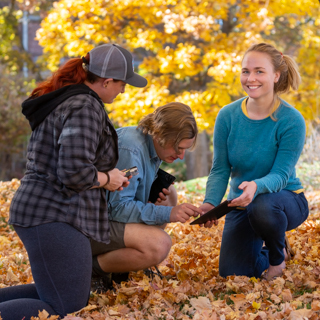Identifying Your Interests
Whether you are interested in developing your own project or working with faculty on an existing opportunity, narrowing down and refining your interests is the first step in finding the right project for you.
At this phase, it’s OK to feel like you have a lot of unrelated interests or unsure if you can come up with a research question. You might feel excited about diving in or overwhelmed at the possibilities. Just remember that you don’t need to know all the answers (and it wouldn’t be a very interesting if you did!) – you just need to think of something you are interested in and want to learn more about.
What is a Research/Scholarship Interest?
A research or creative scholarship interest is a short summary of a topic or method you are interested in. It should be broad enough that many possible research questions or creative projects could come out of it while still being specific enough to articulate what you are interested in learning about.
Examples from UM faculty include:
- Using gaming practices and theories to deliver better course content
- Influence of landscape and habitat changes on aquatic systems
- Detection and characterization of exoplanets
- How people think about their past and their relationships to their own pasts and those of people with whom they are connected
- Operational forest planning for multiple goals
- Turn-of-the-century homesteaders’ narratives
- Arts of the 17th and 18th centuries
Helpful Tips
- What is something you are passionate about? Maybe it is a topic in a course, an interesting article, a current event, a historical period, a skill or hobby, or even a random fact. (Did you know that the unicorn is the national animal of Scotland? I bet you have a lot of questions now.)
- Attend events in your department, on campus, and in the community.
- Do general reading on a topic that interests you – find new sources through bibliographies, talking with a librarian about your interests, asking professors for additional materials, finding other articles or books written by an author, etc.
- Write down and follow up on questions and ideas that come up when you are learning about a new topic, reading primary literature, or going through your day. What new information or questions do they point you to?
- Don’t be afraid to look for interests outside of your major. Many fascinating research and creative scholarship projects come from interdisciplinary work that integrates ideas and methods from across fields in STEM, art, and the humanities. Similarly, most interests could be approached from multiple fields. For example, you could address reversing climate change through the lens of ecology, journalism, technology, business, political science, psychology, or art (just to name a few).
- Spend time looking at the research areas of faculty in your department. You might find specific projects you are interested in, or find a field of research you weren’t aware of.
- Are there research skills you are interested in developing or exploring given your career or academic goals?
The interests and ideas you’ve generated are avenues for exploration – start to follow them and see where they lead. You don’t need to only have one, but you might be feeling like you have too many to follow up on. Here are some suggestions to narrow things down:
- Make a list of all your interests as closely as you can define them. Look for common themes and topics and see how they could be combined.
- Alternatively, look at your list and try to choose just 2-3 interests that you are the most excited about.
- Are some of your interests too far outside of your current skills and discipline? You don’t need to say goodbye to these ideas forever, but they may not be the best choice for right now.
- Are all of your interests suited to research or creative scholarship? Maybe one could become an independent study topic, another leads you to a volunteer interest, and a third to a really good reading list.
- If you are in a course related to your interests, arrange to visit your professor during office hours to ask for insight or advice. Make sure you are prepared for this meeting with specific questions and an idea of what you want to get out of the conversation.
- Set up an advising meeting with us to talk through your interests!
